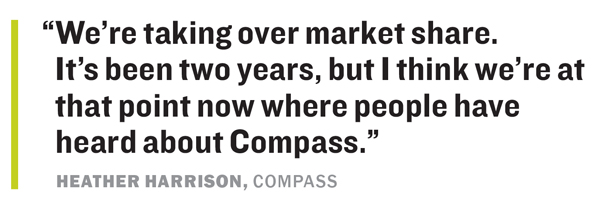Heather and Zachary Harrison weren’t looking to sell their Platinum Drive Realty brokerage in 2017 when suitors began lining up, first Douglas Elliman and then Coldwell Banker.
Then they met Compass CEO Robert Reffkin.
“If ever there was an opportunity, this was it,” Heather Harrison recalled.
On Valentine’s Day the following year, the Harrisons announced the sale of their 100-agent firm to Compass — instantly giving the venture-backed New York City-based brokerage a boost in the coveted suburbs of Westchester County.
The announcement came just months after Reffkin publicly pledged that Compass would control 20 percent market share in the 20 biggest U.S. cities by 2020.
It was an audacious goal, even for a company that had already raised $775 million in venture capital, lured hundreds of top-producing agents across the country with high splits and fat bonuses and made a fair share of enemies along the way.
But two years in, Compass has been unable to overtake Westchester’s top brokerages — Houlihan Lawrence, Sotheby’s International Realty and Coldwell Banker — firms that have been building relationships and closing deals in Westchester for decades. And in the Hamptons, a handful of top brokers have largely shut Compass out of the ultra-luxury market.
The relatively modest gains in Westchester County and the Hamptons are illustrative of Compass’ broader expansion challenges. Unseating entrenched local players requires a lot of money, and the heady days of free-flowing cash that allowed Compass to line up acquisitions and brokers from coast to coast appear to be over.
It presents a conundrum for Compass — to even clear 10 percent in many of its markets would require acquiring local competitors or recruiting their top agents. But the firm — currently valued at $6.4 billion — is, like many unicorn startups today, increasingly under pressure to turn a profit.
“I know the leading brokers in all those markets, and many of them they can’t buy,” said Steve Murray, founder of real estate data firm Real Trends.

Compass ended 2019 with 15,500 agents across 325 offices. The brokerage, which has raised $1.5 billion from investors, said it sold $88 billion worth of U.S. real estate in 2019, up from $33 billion a year prior.
Until recently, when Compass turned to the North Shore of Long Island, the company hadn’t opened a new market since early 2019, and executives have said publicly that it is focused on growing existing markets, not expansion.
Increasingly, rivals say they think Compass’ 2020 plan was all about wooing investors. “It was an aspiration, it wasn’t a real goal,” said one brokerage head. “It was an impress-the-money-people goal.”
As part of a larger look at Compass’ national expansion efforts, TRD analyzed available market data and spoke to over a dozen brokerage heads and top agents in the Hamptons and Westchester County to determine Compass’ impact to date. Compass declined to comment on its 2020 goal.
“It’s a rough, rough game in the Hamptons”
It was late 2015, Hamptons agent Jesse Spooner said, when his boss, Meg Salem, took him to lunch at the Golden Pear to pitch him on joining Compass.
While they were eating, he later testified in court, colleagues were copying listings at their old firm, Saunders & Associates. After the firm’s Bridgehampton office closed for the day, Spooner said, he and Salem secretly emptied file cabinets with client information.
In retrospect, it’s laughable to think Compass’ foray into the monied world of Hamptons real estate would be seamless. After angering rivals in Manhattan by poaching talent, Compass began cherry-picking top agents and managers like Ed Petrie and Ed Reale from competitors Sotheby’s and Brown Harris Stevens. It absorbed a handful of independent firms, too, including Mrs. Condie Lamb Agency, a boutique in East Hampton; Strough Real Estate in Sag Harbor; and Keeshan Real Estate, the oldest family-owned real estate company in Montauk.
 But Compass stumbled relatively early on when rivals BHS and Saunders slammed the firm — and its new hires — with lawsuits. In Saunders’ case, the firm ultimately dropped claims against Compass, but a jury in 2018 found Salem guilty of data theft charges.
But Compass stumbled relatively early on when rivals BHS and Saunders slammed the firm — and its new hires — with lawsuits. In Saunders’ case, the firm ultimately dropped claims against Compass, but a jury in 2018 found Salem guilty of data theft charges.
With 119 agents in six offices, Compass is currently the No. 5 residential firm on the East End based on listing volume, according to TRD’s analysis of 2,416 properties listed for sale on HamptonsRE.com on Feb. 13. Corcoran is the largest with 22.68 percent of listings, followed by Douglas Elliman (20.69 percent), Saunders (19.08 percent), Sotheby’s (10.8 percent) and Compass (9.18 percent).
But sources said the firm hasn’t made inroads into the Hamptons’ ultra-luxury market, which has taken a beating due to rising prices, shrinking Wall Street bonuses and general uncertainty. Although sales in 2019’s fourth quarter rose 7.2 percent compared to a decade prior, the average closing price dropped 7 percent during the same period, according to Douglas Elliman and appraisal firm Miller Samuel.
Amid that slump, Compass nibbled around the edges of the high-end market in 2019, accounting for around 3 percent of sales over $10 million, according to data provided by Bespoke Real Estate.
Bespoke, a boutique that focuses exclusively on luxury properties, accounted for 26.5 percent of sales above $10 million, followed by Corcoran (22 percent), Sotheby’s (15 percent), Saunders (13.5 percent), Elliman (13 percent) and Brown Harris Stevens (4.5 percent).
“The Compass effect has yet to take hold,” said Cody Vishinsky, who founded Bespoke in 2014 with his brother, Zachary. Despite slick marketing, he said, Compass’ business model is no different from that of traditional firms: “It’s a nice, shiny facade, and when you get in it has the same fundamental elements the other firms do.”
After alienating rivals by aggressively courting top agents, Compass found itself on the outside of a tight-knit group of top agents and firms that handle most of the biggest deals. “It’s a very specific market,” said one longtime manager, referring to an old guard that maintains deep relationships with wealthy New Yorkers.
In the $10 million-plus market, where only 40 or 50 deals actually happen each year, there’s also a certain self-selection whereby a small group has become the go-to set of brokers for a certain caliber of property.
“The reality is, you’re seeing a lot of the same players” do most of the big deals, said Vishinsky, whose firm currently has $1.7 billion in listings. Vishinsky said Bespoke operates like a hedge fund by basing decisions on deep research. In addition, it doesn’t have independent agents (other than the brothers); instead, it employs a staff to work collectively for clients. “For us, it was all about carving out a niche and being smart [to] corner the market as much as we could,” he said. “To do something different, you actually have to do something different.”
Rivals said Compass’ key differentiators are high commissions and signing bonuses, a claim that Compass has previously said is overblown. “They’re clearly paying them to come,” said one brokerage head. “And they’re paying them unsustainably high rates.”
In recent months, Compass’ recruiting seems to have picked up. In November, Corcoran’s Cee Scott Brown and Jack Pearson, who sold $500 million over the past five years, joined Compass. So did Chris Coleman, Saunders’ No. 1 agent with $108.5 million in sales in 2019. “We think it’s the best place to do business,” he told TRD of the move.

Outside of the Hamptons — but on Long Island — Compass is planning offices in Manhasset and Cold Spring Harbor. In mid-February, longtime Elliman broker Nicholas Colombos announced on social media that he was joining Compass in Manhasset.
“Our Long Island agents can now support their clients with Compass’ technology and suite of services whether they’re in Manhattan, Montauk, or Manhasset,” Rory Golod, regional president (and Long Island native) said in a statement.
On the East End, rivals said brokerages in general are facing heightened competition. As a second-home market, Hamptons real estate is particularly vulnerable to market swings. Increasingly, buyers are going directly to the listing agent to avoid paying a broker fee. (Sellers pay the listing agent’s commission.)
“In general, people feel empowered to go after commissions,” said one brokerage chief. “It’s a rough, rough game in the Hamptons. You’re constantly under siege.”
“Just getting started” in Westchester
Historically, Westchester’s top brands have been hard to unseat. Both William Raveis and Douglas Elliman have tried to break in, with limited success.
Though Compass gained a foothold with its acquisition of Platinum Drive Realty, data from the Hudson Gateway MLS shows that it hasn’t exceeded 5.5 percent market share in Westchester, trailing behind Houlihan Lawrence (29 percent), Sotheby’s (11.1 percent) and Coldwell Banker (7.2 percent).
“Houlihan Lawrence has maintained its three-to-one dominance despite the efforts to bite into that apple,” said David Turner, one of Houlihan’s top agents, who sold more than $94 million in real estate last year, according to Real Trends.
Established in 1888, the 1,300-agent firm accounted for 30 percent of sales in the county last year. Since 2017, when it was acquired by Berkshire Hathaway’s HomeServices, it’s had even more firepower.
According to Heather Harrison, though, Compass’ growth is just getting started.
“We’re taking over market share,” she said. “It’s been two years, but I think we’re at that point now where people have heard about Compass.” She added that buyers and sellers seem “hungry” for a new way of transacting. “Real estate was very sleepy out here. Compass is taking it to a whole new level,” she said.
As of October 2019, Compass had 180 agents across six offices in Armonk, Chappaqua, Dobbs Ferry, Larchmont, Scarsdale, Rye Brook and White Plains. It reported $228 million in sales for the first half of 2019, according to Westchester Magazine, and it’s made inroads in submarkets like Dobbs Ferry and Scarsdale, where Coldwell Banker closed an office at the end of last year.
“[Compass has] taken a handful of agents from different companies, but no major raids,” said one brokerage source.
Longtime Westchester brokers said some of Compass’ tools, including Concierge and bridge loans, offer limited value to a well-heeled clientele. “Our homes are pretty high-end and the clients are well off, so they don’t need staging or financing,” said Sheila Stoltz, who works for Houlihan Lawrence in Bronxville.
Others gave the SoftBank-backed company more credit.
“We have lost several agents to Compass, and we have had success recruiting from Compass,” said Paul Breunich, president and CEO of William Pitt-Julia B. Fee Sotheby’s International Realty. “Last year as a company we recruited $350 million of production. Agents have options.”
Turner said the competition is good for business, but he believes market share still goes a long way with buyers and sellers.
“When I go on a listing pitch, I show them the market share,” he said. “If a seller can say their broker has three-to-one over the competition, why would you go with anyone else?”
